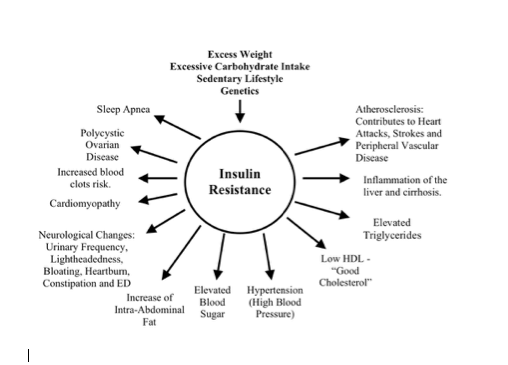Sarita Dhuper, MD, FACC, Founder and Executive Director, Live Light Live Right
Insulin is a hormone made in the pancreas by a group of cells called Beta cells. When we eat carbohydrates—sugars and starches found in many foods they finally convert into glucose that enters the bloodstream. With the help of insulin, cells throughout the body absorb glucose and use it for energy. Insulin helps muscle, fat, and liver cells absorb glucose from the bloodstream, lowering blood glucose levels and when there is excess it stores it in the form of glycogen in the liver.
However with increased weight gain, there is an associated condition called ‘ Insulin Resistance’ where muscle, fat, and liver cells do not respond properly to insulin and thus cannot easily absorb glucose from the bloodstream. As a result, the body needs higher levels of insulin to help glucose enter cells. As long as the pancreas is able to sense this increased need there is associated increased production of insulin that maintains a normal blood sugar but continues to store excess amounts of the carbohydrates in the liver, muscle and fat. Over time, insulin resistance can lead to type 2 diabetes and prediabetes because the beta cells fail to keep up with the body’s increased need for insulin. However even before this happens the hyperinsulinemic response can further worsen the obesity and drive storage into fat, while promoting more hunger as there is less of circulating fuels now available. The precursors of insulin resistance are known to be obesity and physical inactivity. This state is associated with a disorder called ‘ Metabolic Syndrome’ in which a patient develops hypertension, Central fat deposition in the belly, high triglycerides levels, low HDL ( good cholesterol ) and elevated glucose level. Over time these patients either develop diabetes, cardiovascular disease or become progressively obese.
To reduce the risk of developing insulin resistance and progression of obesity complications, once should be physically active for at least an hour a day and include strength and aerobic activities, eat small and more frequent meals of low glycemic foods and try to lose about 5 % of their body weight.
Please check with your doctor if you think you may have insulin resistance. You may be at risk if you are overweight and carry the fat around the belly, have hypertension, Poor physical conditioning, crave carbohydrates and sweetened beverages, abnormal triglycerides. Please get a fasting insulin and glucose level done or get an oral glucose tolerance test done preferable with insulin levels.
For further information or to be evaluated at Live Light Live Right please call Dr. Dhuper’s office at 718-240-5857.

